Meet Women in STEM

Here at the Lab, there are many women ornithologists who apply their unique skills and passion to their chosen field, be it conservation, citizen science, education, or field studies. We reached out to just a few of them to see if they had any advice for students interested in science, technology, engineering, or math (STEM).
Read below to meet Jessie, Program Manager of the Macaulay Library, Amanda, an ecologist, and Ashley, a conservation social scientist.
Here’s what they had to say:
1. What got you interested in your current field of study?
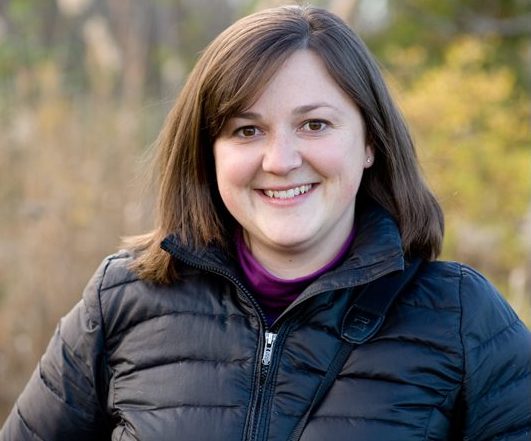
Photo courtesy of Jessie
Jessie: “My interest in birds started when I was ten years old. I was lucky because my 6th grade science teacher was also interested in birds and he helped me get connected to the birding community. There were plenty of days in middle school when I was picked on for liking birds, but I’m glad I stuck with it! My interest in birds has taken me from the Arctic Circle to the Antarctic and many points in between. Whether I am participating in a research project or teaching people about birds in the field or through online activities, I’m excited to be always learning!”

Photo courtesy of Amanda
Amanda: “I have always loved being outside and enjoyed nature. The more time I spent in nature, the more I wanted to learn about the environment and the species that share the planet with us. The more I learned, the more I wanted to work towards finding ways to protect and conserve it.”

Photo courtesy of Ashley
Ashley: “During and after college I worked in marine and wildlife biology positions on both coasts of the United States and Canada. My interests in the human dimensions of conservation developed from observing unaddressed conservation challenges for the wildlife that I studied. For example, I wondered why some people would do things that hurt wildlife or their habitats, while others fought to protect wildlife or their habitats. After several years creating education and outreach programs to try to engage people in conservation action, I was drawn to pursue graduate work in the social sciences to consider that which perplexed me the most: how are human attitudes and behaviors related to wildlife conservation formed and changed? At Colorado State University, I obtained my MS in Human Dimensions of Natural Resources (2006), studying the wildlife values of the public in Western states. I then served as the Education and Outreach Director for Klamath Bird Observatory (Oregon) where I developed my conservation approach that includes social science research and application of this information to education, outreach, and communications activities, working in collaboration with ecological scientists.”
2. Why do you think it is important for women to be represented in your field?
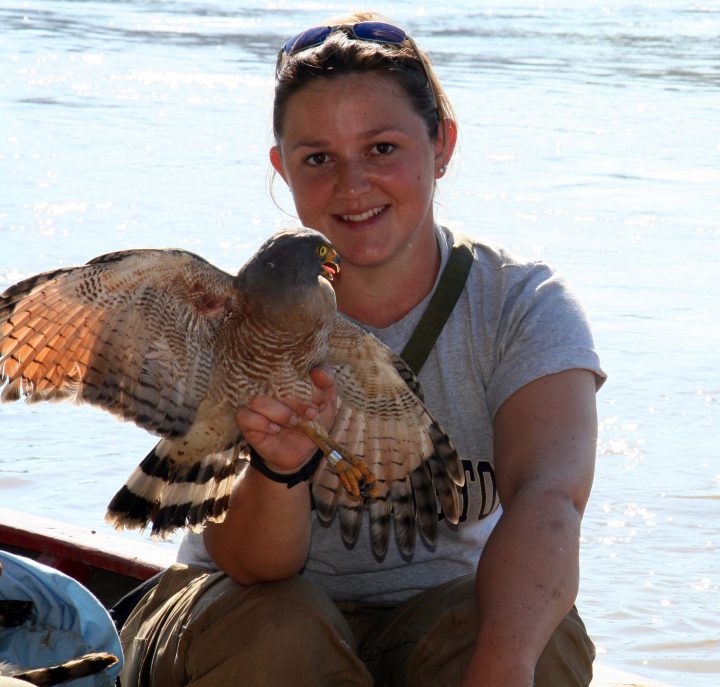
Photo courtesy of Jessie
Jessie: “Birds and the environment face many threats and we need more people to care about protecting the natural world. Half the world’s population
are women, so it’s critical that women are engaged in science and conservation.”
Amanda: “Diversity brings different perspectives and different insights, which is important in every field.”
Ashley: “I think it’s important for all types of people to be involved in science and conservation fields — if they have the interest (and I hope all types of people do!). Particularly, when it comes to social science, which is the study of people, it’s essential for all types of people to be involved in research and application. After all, we are studying and working with people, so different perspectives of researchers and conservation professionals help improve the quality and effectiveness of our work.”
3. What has been particularly rewarding (or challenging) about being a woman in your field?
Jessie: “Being a woman in a field dominated by men, I feel is an advantage. You stand out in a crowd if you are a younger woman in a room with mainly older men. It helps people remember you. All the people you meet and connections you make, which can start in middle and high school, will help you down the road. I’m extremely grateful for many people who helped me make connections and offered opportunities I would never have been able to experience without their help. I believe the combination of my knowledge of birds, the birding and ornithological communities, and my ability to organize a team has enabled me to be successful in my career. Expertise in one of those components wouldn’t have been enough—it’s really about combining multiple interests and skill sets that leads to success.”
Amanda: “This field can be fantastically exciting and there are so many opportunities to travel, do exciting research, and work with interesting people around the world. I love that I can “follow” the birds I study in North America during the breeding season down to Central and South America to study them on their wintering grounds. Certainly, I am so grateful to have the ability to head down to the tropics when it is the deep freeze of winter in Ithaca! I also love my work and find it rewarding because I feel that I am making a difference and helping to make the world a better place.”

Photo courtesy of Ashley
Ashley: “I find it very rewarding to see how many young women are interested in science, especially science beyond the traditional view of science with a scientist working in a laboratory in a white lab coat. When I was an environmental educator, I saw how interested school-age children (boys and girls) became in studying wildlife in the field. I hope that some of them are now heading off to college to study ecology or conservation science. In my past 6 years at Cornell University, I’ve worked with many talented female college students interested in conservation social science. Some of them have gone on to graduate school in our field, and others have great jobs in environmental communications. I am inspired by their contributions to the field!”
4. What advice would you give young girls interested in STEM?
Jessie: “Try to find something you love and work hard to make it your career. If you can create a career that includes your passion, going to work each day can be fun! I love what I do and it’s rewarding to be spending time working towards things I care about. All the experiences you gain will be helpful in some way. You might be surprised someday at something you did in middle school or high school was a springboard to the next cool opportunity. If you are at all interested in computer programming, take some classes or teach yourself how to write code. It’s an extremely valuable skillset. Programming is not for everyone, but if you like it, go for it! People who can combine skills in, for example, computer science and ornithology are particularly valuable to any team.”
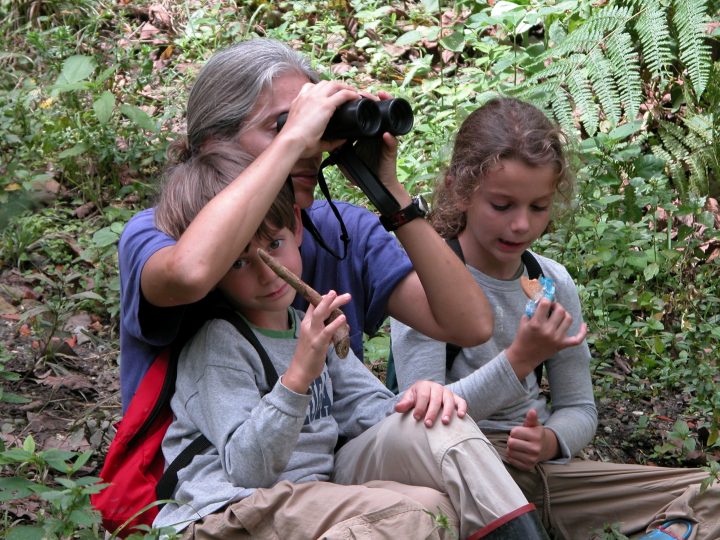
Photo courtesy of Amanda
Amanda: “Think big, dream big, and always be looking for opportunities. There are more opportunities out there than you realize, but you have to see and recognize them and sometimes make them.
Don’t be afraid to try different paths – after all, learning what you don’t like is just as valuable as learning what you do like. Speaking of paths, don’t let anyone convince you that you can’t have a family and be a scientist. You absolutely can. I had two children early in my career (one right at the end of my doctorate degree) and I’ve even involved them in my fieldwork.
If you hear that little voice in your head saying that you aren’t good enough or you’re worried that you aren’t as good as people think you are, know that those feelings are common. Seriously; trust me on this one! Many (if not most) people feel insecure at times even though they don’t admit it. But that doesn’t mean that those insecure thoughts are true. I love the saying, ‘the only problem with our thoughts is that we believe them.’”
Ashley: “My advice is to pursue your passion. Never let anyone tell you that you can’t do something because of your gender, your age, or for any other reason. Any type of person can work hard, study hard, and contribute greatly to science. If you’re most interested in conservation science, then it’s important to have lots of experiences in conservation that build your skills and understanding of the field. When you first start out, these will probably be volunteer experiences. For my first internship in college, I wrote an email to the professor who studied the topic I was most interested in at the time (sea otter behavior). He connected me to his graduate student studying sea otters on the California coast. I volunteered with her for several weeks, and it changed my life and my career. From there, I had more wildlife conservation internships, which ultimately led me to the graduate work and jobs I’ve had since.”
Share these words with your students, particularly any young women you know who show a talent and passion for science, technology, engineering, or math! As all these scientists agree: follow your dreams and work hard for a rewarding career in STEM!
More about the scientists:
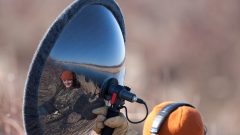
Photo courtesy of Jessie Barry
Jessie Barry was the Project Leader for the development of mobile and web applications of the Merlin Bird ID app at the Cornell Lab of Ornithology. The Merlin app offers users help identifying birds using photos. Thanks to a great collaboration with a computer scientist specializing in computer vision, Merlin is starting to learn how to identify birds in images. Jessie is now the Program Manager for the Macaulay Library, an archive of animals sounds and video, which collects and then shares recordings for research, education, and conservation purposes. She also spends a lot of time in the field and the classroom to conduct research projects and teach young birders new skills.
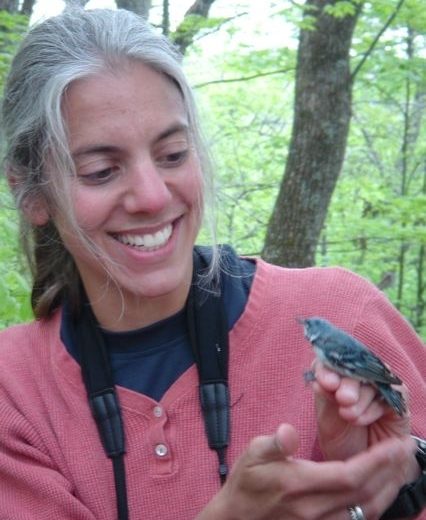
Amanda holding a Cerulean Warbler Photo courtesy of Amanda Rodewald
Amanda Rodewald is the Director of Conservation Science at the Cornell Lab of Ornithology. As an ecologist, she focuses on studying how human activities influence animal populations and communities. Most of her research has focused on understanding how agriculture, forest management, and urban development affect forest birds in eastern North America and the Andes Mountains of South America – especially for declining and sensitive species. She currently has projects in Alaska, Guatemala, Honduras, Panama, Colombia, Ecuador, Peru, and Chile. In an effort to have her research inform management decisions, Amanda regularly works with state and federal management agencies, conservation organizations, and private landowners.
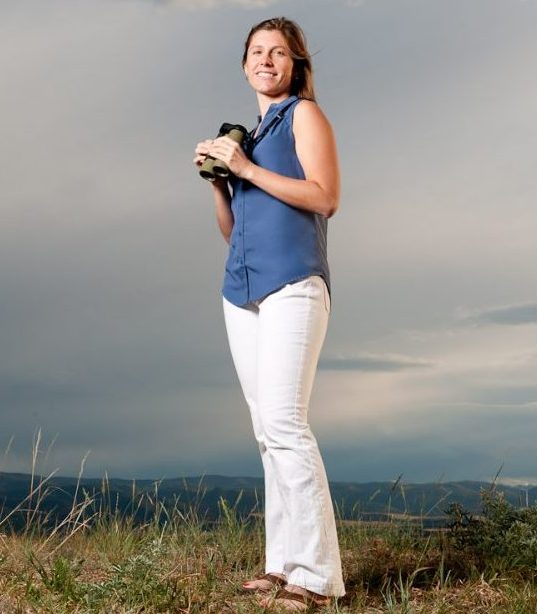
Photo courtesy of Ashley Dayer
Ashley Dayer is a Conservation Social Scientist at the Cornell Lab of Ornithology. She focuses on understanding how to best implement conservation priorities through effectively working with people and organizations. A leader in national and international bird conservation, Ashley actively participates in conservation networks through her affiliation with Cornell Lab of Ornithology, including the North American Bird Conservation Initiative, and the North American Waterfowl Management Plan. She also helped establish the Bird Education Alliance for Conservation.
Ashley is the author of a blog post about a conservation social science study she and her colleagues conducted.